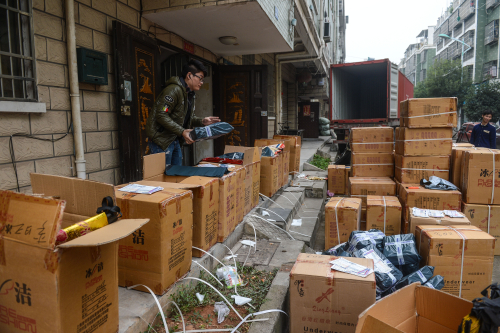|
 |
|
LET'S GO TO THE MALL: An online store owner in Qingyanliu Village, Zhejiang Province, packs express packages during last year's "Double 11" shopping festival, which is held by Taobao every November 11 (XU YU) |
Before the Internet era, China's farmers had to make hard choices between living poor at home or earning more money in unfamiliar cities. Now, they can make money at home with their families by turning agricultural products into fortunes.
Grass and willow wickerwork is a 600-year-old traditional handicraft of Wantou Village in Boxing of east China's Shandong Province. In 2008, the first online store in the village began to introduce the handicraft to the outside world. Today, this village with 1,700 households runs over 1,000 online stores selling wickerwork products. Nearly 30 stores have created an annual sales volume over 1 million yuan ($159,000). Now, Wantou Village is honored as one of the 14 Taobao villages by Alibaba. "E-business has brought us is not only much more income but also an improvement of the overall condition of our village," said An Baokang, an online store owner in Wantou. "Paying more attention to our online stores, we can introduce our hometown's handicraft to a wider audience."
With the development of e-businesses, more and more farmers from Wantou are able to sell their local agricultural products on the Internet, which brings them more income by omitting intermediate distributors.
Gao Hongbing, Vice President of Alibaba, pointed out that considering the number of Taobao villages, online stores and employees, Taobao villages are really blooming. "Taobao villages have become formidable in influencing the development of China's rural economy," said Gao. "E-commerce has become a natural way for modern farmers to conduct their businesses at home." At the same time, local governments are intentionally boosting the development of Taobao villages by opening professional schools to teaching everything from beginner-level computer skills to advanced customer service.
However, several hidden risks such as vicious competition and ineffective supervision can wreak havoc on these small businesses.
"It took only a few years to cultivate over 200 Taobao villages. On one hand, it shows a rapid growth of online store owners in rural areas. On the other hand, it indicates a future with much fiercer competition between sellers and Taobao villages," said Liu, a successful Taobao cashmere salesman in Donggao Village of Hebei.
Such competition has already emerged. It is very common that most products in a Taobao village are similar, which leads to excessive undercutting that may end in meager profits.
Recently, Chinese authorities have lashed out against the quality problems on the Taobao platform. Realizing efficient quality supervision of e-businesses has become a pressing issue for both Alibaba and the government.
"Fortunately, the opportunity is still bigger than the risks. As long as they are properly guided and supervised, Internet-based retail in rural areas will boost domestic consumption," said Qing Zhongchun, a researcher at the Development Research Center of the State Council.
Email us at: dingying@bjreview.com
What Is a Taobao Village?
According to Alibaba, a Taobao village is any place where 10 percent of local population is engaged in online retailing and makes at least 10 million yuan ($1.6 million) from the Taobao platform annually. Alibaba's statistics show that there were already 20 such villages across China in 2013, and 212 villages in 2014 spreading in 10 municipalities and provinces. These Taobao villages include over 70,000 online stores offering more than 280,000 jobs.
Alibaba started to launch a strategic plan in October 2014, according to which there will be at least 100,000 Taobao villages in China in three to five years. By then, over 1 billion yuan ($160 million) of transaction volume will take place on Taobao's e-commerce platform every day. | 